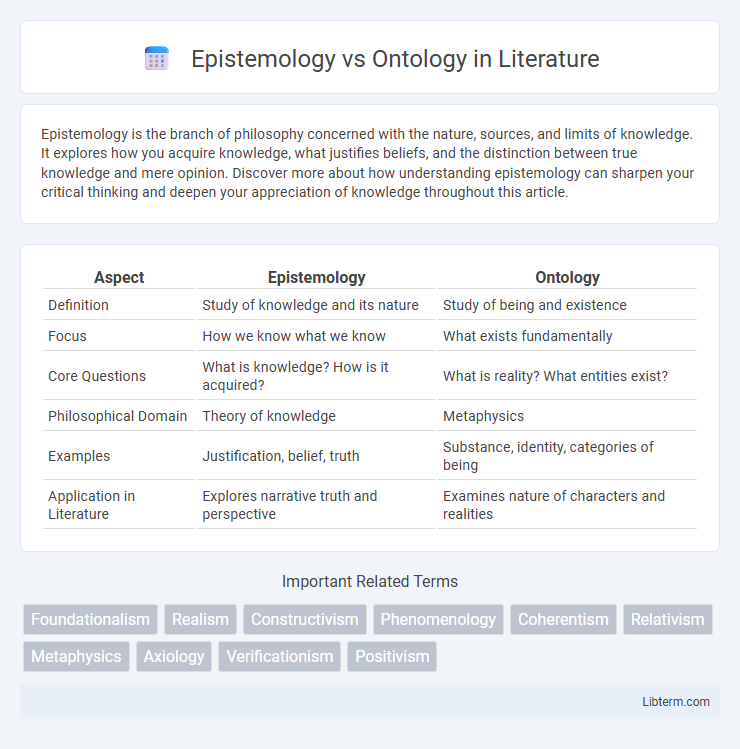Epistemology is the branch of philosophy concerned with the nature, sources, and limits of knowledge. It explores how you acquire knowledge, what justifies beliefs, and the distinction between true knowledge and mere opinion. Discover more about how understanding epistemology can sharpen your critical thinking and deepen your appreciation of knowledge throughout this article.
Table of Comparison
| Aspect | Epistemology | Ontology |
|---|---|---|
| Definition | Study of knowledge and its nature | Study of being and existence |
| Focus | How we know what we know | What exists fundamentally |
| Core Questions | What is knowledge? How is it acquired? | What is reality? What entities exist? |
| Philosophical Domain | Theory of knowledge | Metaphysics |
| Examples | Justification, belief, truth | Substance, identity, categories of being |
| Application in Literature | Explores narrative truth and perspective | Examines nature of characters and realities |
Introduction to Epistemology and Ontology
Epistemology studies the nature, scope, and limits of knowledge, focusing on how we acquire, justify, and validate beliefs. Ontology examines the fundamental categories of being and existence, exploring what entities exist and how they can be grouped and related. Together, epistemology and ontology form the foundation of philosophical inquiry into knowledge and reality, shaping disciplines like metaphysics and epistemic theory.
Defining Epistemology: The Study of Knowledge
Epistemology is the branch of philosophy that examines the nature, origin, and scope of knowledge, focusing on how knowledge is acquired and validated. It addresses questions about belief, truth, and justification, determining what constitutes valid knowledge versus mere opinion. Epistemology contrasts with ontology, which investigates the nature of being and existence, while epistemology centers on understanding knowledge itself.
Defining Ontology: The Nature of Being
Ontology explores the fundamental nature of being, existence, and reality, addressing questions about what entities exist and how they can be categorized. It examines the structure of reality, including concepts such as objects, properties, and their relationships, to provide a framework for understanding what it means to "be." This branch of metaphysics contrasts with epistemology, which centers on the nature and scope of knowledge rather than the nature of existence itself.
Key Differences Between Epistemology and Ontology
Epistemology explores the nature, scope, and limits of knowledge, questioning how we know what we know and the justification of beliefs. Ontology studies the nature of being, existence, and reality, focusing on what entities exist and their relationships. The key difference lies in epistemology's concern with knowledge acquisition and validation, while ontology addresses the fundamental structure and categorization of reality itself.
Importance of Epistemology in Research
Epistemology is crucial in research as it defines the nature and scope of knowledge, guiding researchers on how to validate and justify their findings. It shapes the methodology by determining the criteria for evidence and the processes for acquiring reliable information. Understanding epistemology ensures the integrity and credibility of research outcomes by aligning methods with the underlying theory of knowledge.
The Role of Ontology in Philosophical Inquiry
Ontology plays a critical role in philosophical inquiry by examining the nature of being, existence, and reality, providing the foundational framework for understanding what entities exist and how they can be categorized. It establishes the basic categories and relationships that shape metaphysical theories and influence epistemological questions about knowledge and belief. By clarifying the structure of reality, ontology informs other branches of philosophy, guiding the methods and scope of philosophical investigation.
How Epistemology and Ontology Interact
Epistemology and ontology interact by defining the relationship between knowledge and the nature of existence, where ontology addresses what entities exist and epistemology explores how we can know or understand those entities. The interplay shapes research methodologies by influencing whether inquiries prioritize objective reality or subjective interpretation. This dynamic guides the framing of questions and the validation of knowledge claims across philosophical and scientific disciplines.
Practical Applications in Academia and Science
Epistemology, the study of knowledge acquisition and validation, guides research methodologies and data interpretation in academia and science, ensuring rigorous evidence-based conclusions. Ontology, concerned with the nature of being and existence, influences conceptual frameworks and classification systems, shaping how scientific phenomena and academic subjects are defined and organized. Together, these philosophies underpin the design, execution, and evaluation of research, impacting fields ranging from social sciences to natural sciences by clarifying what can be known and how entities are categorized.
Common Debates: Epistemological vs Ontological Perspectives
Epistemology centers on the nature and scope of knowledge, questioning how we know what we know, while ontology examines the nature of being and existence. Common debates arise around whether knowledge depends on the structure of reality (ontology) or whether reality is constructed through knowledge (epistemology). These perspectives often clash in fields like philosophy of science and social theory, influencing interpretations of truth, reality, and the validity of knowledge claims.
Conclusion: Integrating Epistemology and Ontology
Integrating epistemology and ontology enhances comprehensive understanding by connecting knowledge acquisition with the nature of being, enabling more robust frameworks in philosophy and science. This synthesis allows researchers to address both how we know what exists and what fundamentally exists, fostering interdisciplinary coherence. A balanced approach to epistemology and ontology drives deeper insights into reality and validates claims about knowledge simultaneously.
Epistemology Infographic

 libterm.com
libterm.com